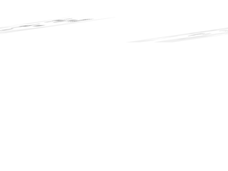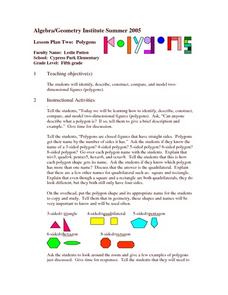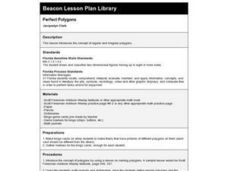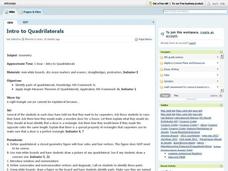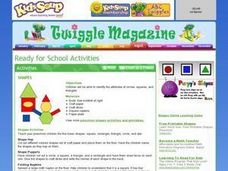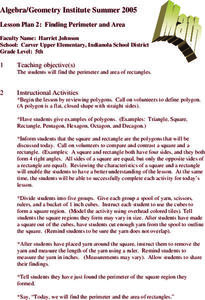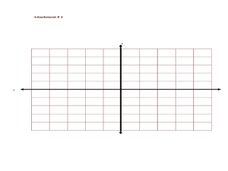Utah Education Network (UEN)
Create, Classify, and Sort Quadrilaterals
Quadrilaterals can be quirky! Fourth graders use geoboards and bands to create four-sided figures. They analyze the attributes such as angle size and presence of parallel sides. As a result they learn to differentiate among...
Curated OER
Attributes of Polygons: Stretchy Shapes
Fourth graders use dancing methodology in a polygon and shape activity. For this shape and dance lesson, 4th graders discuss shapes in dance, math, and everyday life. Students use dancing activities to recognize and analyze shapes.
Curated OER
Classifying Polygons
Seventh graders participate in a polygon hunt. In this polygon lesson, 7th graders examine how polygons are alike and different. Students create a Venn diagram and label the sorting circles. Students work in cooperative...
Curated OER
Naming Shapes
Students study geometric shapes and practice naming them properly. In this geometry lesson, students work in groups to give definitions of the vocabulary to each other in their own words. Students also visit a lower grade and teach...
Curated OER
Regular Polygons
Fifth graders explore polygons. In this math instructional activity, 5th graders find examples of regular polygons in the classroom and measure the sides of figures to determine if they are regular polygons.
Curated OER
Algebra/Geometry Institute: Area of Polygons
Middle schoolers find the area of polygons. In this area of polygons activity, students find the area of parallelograms, rectangles, squares, and other polygons. They identify each given figure and determine the appropriate...
Curated OER
Lesson Plan Two: Polygons
Learners explore the concept of polygons on a two-dimensional plane. They identify polygons in everyday life and draw different polygons according to their classification. Using a geoboard and geobands, they consrtuct polygons and even...
Curated OER
Quadrilaterals
Students construct a variety of four-sided figures using a K'NEX Geometry Set. They view and discuss pictures of shapes, then in small groups they construct as many four-sided shapes as possible using the K'NEX Rods and Connectors. As a...
Teachers Network
A World of Symmetry: Math-Geometry
Define and identify the three basic forms of symmetry translation, rotation, and glides with your class. They cut out and arrange paper pattern blocks to illustrate symmetry, create a Cartesian graph, and design a rug with a symmetrical...
Curated OER
Polygons Defined
Fourth graders explore polygons. In this polygon lesson, 4th graders sort polygons according to their properties. Students discover the connection between polygons and the Greek language.
Beacon Learning Center
Perfect Polygons
Don't worry if you do not have the mentioned textbook; there is enough material here for you to carry out a pertinent polygon plan. After introducing your class to various polygons and the prefixes that help identify them, hand out...
Curated OER
Perimeter
Fifth graders create math word problems. In this geometry lesson, 5th graders define perimeter and discover how to find the perimeter of a rectangle, a square and a regular polygon. Students write word problems on finding the...
Curated OER
What a SHAPEly Fit!
Students identify and explore the attributes of polygons. They design and create a quilt square using polygons, and produce a class quilt.
Curated OER
Geoboard Squares
Students create squares of different sizes on a geoboard. They find and describe a pattern. Students use the pattern to determine the number of squares possible on a 10-by-10 geoboard. They create squares with a horizontal base (and...
Curated OER
Intro To Quadrilaterals
Students engage in a lesson that is concerned with the concept of quadrilaterals and how they are used to create a rectangle for a door. They create a drawing of a quadrilateral while finding the sum of the angles. They practice problems...
Curated OER
Shapes
Students review basic shapes, such as circles, squares, triangles, and rectangles, find objects in those shapes in classroom, watch Clifford's Fun with Shapes video, practice reproducing four shapes, and rotate through four classroom...
Curated OER
Shapes Activities and Lessons
A fabulous lesson on identifying circles, triangles, squares, and rectangles awaits your learners. They use large motor skills hopping from shape to shape, use visual and kinesthetic skills passing a ball of yarn between three people to...
Curated OER
Finding Perimeter and Area
Geometers find the perimeter and area of rectangles. They discuss the definitions and characteristics of rectangles and squares. In groups, they use yarn to discover the perimeter of squares and rectangles. They count cubes to explore...
Curated OER
Battle Shapes
Fifth graders play Battleshapes which is a variation of Battleship with geometry. In this geometry instructional activity, 5th graders get a graph paper with four quadrants. They call out coordinate points and attempt to sink their...
Curated OER
Math: a World of Symmetry
Students expand their knowledge of quadrilaterals and identify basic symmetrical forms. Over three weeks, they explore the math, application, and discussion of symmetry. After conducting Internet research, students create symmetrical...
Curated OER
Properties of Special Parallelograms
Students identify properties of trapezoids. In this geometry lesson, students are put into groups and use computer programs to analyze polygons. They drag and move the shapes around as they make predictions.
Curated OER
Squares
Students identify shapes that are squares. In this square lesson, students identify the square items and then sing songs about squares.
Curated OER
Area and Perimeter of Rectangles
Discover the difference between area and perimeter. Learners are grouped in twos and threes and each group has one advanced/gifted learner to serve as the peer helper. They receive manipulatives to help them determine the area and...
Curated OER
Area and Perimeter Review
Students calculate the area and perimeter of different shapes. For this geometry lesson, students name the different polygons based on their number of sides. They use the correct formula for each shape to calculate the area and perimeter.





